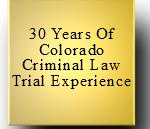Exclusively Practicing Only Colorado Criminal
Law - Defending Your Future

You may wonder why a judge has the legal right to force you to remain in Colorado (away from your family and friends) as a condition of your bond when you are a resident of another state.
This article addresses issues surrounding the setting of bail in Colorado and the laws that give judges so much power and authority to set the conditions of your freedom even though you have been convicted of nothing and are presumed to be innocent. A recent Colorado Supreme Court case People v. Jones , 2015 contains an analysis if the almost limitless power of a Judge to set bond 16-4-204 and 13-4-102, C.R.S.
When a judge rules within his or her discretion and an appeal of that ruling is governed by what is called the “abuse of discretion standard” that judge’s ruling which includes the setting of and conditions of bond will NOT BE REVERSED ON APPEAL UNLESS THERE IS AN ABUSE OF THAT DISCRETION.
What is an abuse of discretion? A lower Court will only be found (on appeal) to have abused the Court’s discretion if the Court’s decision was manifestly arbitrary, unreasonable, or unfair, or if the Court misconstrues or misapplies the law.
The test on appeal of the Judge’s decision is not whether another Judge “would have reached a different result but, rather, whether the trial court’s decision fell within a range of reasonable options.”
Therefore the “one bite of the apple” rule applies as a reality to Colorado criminal defense lawyers. Your Colorado criminal defense lawyer will have one first chance to persuade the trial judge to set reasonable conditions of bond that favor the defense at the very start of the case.
Colorado law mandates that the primary interest in setting the amount and conditions of bond is to make certain that a defendant on bond will appear at the time and place required to answer to the criminal charge. Under 16- 4-103(3)(a) -the type of bond and conditions of release shall be sufficient to reasonably ensure the appearance of the person as required.
For example, Colorado law allows a Judge the right to refuse a Defendant the right to leave the state while a case is pending. The Judge may find that denying the Defendant the right to leave the state “reduces the risk of flight.” Put another way compelling a Defendant to remain in the state makes it more likely the Defendant will appear at all court proceedings and less likely the Defendant will abscond.
Consistent with these Standards, each jurisdiction should adopt procedures designed to promote the release of defendants on their own recognizance or, when necessary, unsecured bond.
Additional conditions should be imposed on release only when the need is demonstrated by the facts of the individual case reasonably to ensure appearance at court proceedings, to protect the community, victims, witnesses or any other person and to maintain the integrity of the judicial process.
Whenever possible, methods for providing the appropriate judicial officer with reliable information relevant to the release decision should be developed, preferably through a pretrial services agency or function, as described in Standard 10-1.9.
In addition to providing for an early determination of the type of bond and conditions of release for all bailable defendants, the statutory scheme details the purposes to be served by, and the criteria to be considered in making, those determinations.
You can find the original text of each of these laws by using this link to Colorado Statutes:
There are FOUR key statutes that govern bail bonds in Colorado.
They are:
A summary of the significant changes in approach to setting Bail in Colorado is provided below ( attribution is given to the Colorado Commission on Criminal and Juvenile Justice (CCJJ)).
The legislative history of the new law…reveals that the General Assembly was primarily concerned with reducing unnecessary pretrial detention by limiting the use of secured financial conditions of release, with an overall strategy of using research-driven best practices in the administration of bail. The new law was drafted so as not to diminish existing judicial discretion at bail, and many of the substantive changes are optional; nevertheless, like the prior law, the new statute contains important mandatory provisions that judges and others should note.
Significant statutory provisions include:
This section changes the definition of bail from “the amount of money” to “a security, which may include a bond with or without monetary conditions.” The term “security” is used broadly, as in a pledge, and does not itself mean money. The definition is important because it represents the intent of the General Assembly to place the use of money on par with all other non-monetary conditions of pretrial release that must be individually assessed for legality and effectiveness.
To further emphasize this intention, all references to judges “ setting the amount of bail and type of bond” have been changed to “setting the type of bond and conditions of release.”
This section, which mostly mirrors Article II, Section 19 of the Colorado Constitution concerning the right to bail, remains the same with one important exception. On the House floor, a fifth category of offenses for which bail may be denied was added to the statute. This new Section, 16-4-101 (1) (b) (V), along with Section 16-4-101 (1) (b) (IV) from prior law, has no counterpart in the Colorado Constitution and has thus been appropriately described by the Colorado Attorney General’s Office as “constitutionally suspect.”
This section is substantially different from prior law, and contains the language meant primarily to implement the three CCJJ recommendations as well as housing various parts of prior Section 16-4-105 concerning criteria for setting bond conditions. Readers should note the important interaction between provisions mandating action through the use of “shall” or “must,” and those that are merely permissive.
Overall, this section requires
While the prior statute technically listed two bond types unsecured (or “personal recognizance”) and secured secured bonds were more colloquially named based on how they used money as a condition of release (e.g., “cash” or “surety”). The new statute now lists four bond types, each more appropriately defined by its restrictive nature. Subsection (a) bonds are unsecured personal recognizance bonds with only statutorily mandated conditions. Subsection (b) bonds are unsecured personal recognizance bonds with additional non-monetary conditions necessary for public safety or court appearance. Subsection (c) bonds are secured money bonds when the secured financial condition is “reasonable and necessary to ensure” court appearance or public safety. Subsection (d) bonds are secured by real estate to be ordered only when release on personal recognizance without monetary conditions will not assure court appearance or public safety.
[HMS The new law restricts the power of the District Attorney]
Under prior law, district attorneys could withhold their consent to a personal recognizance bond in certain situations, forcing judges to set secured money amounts. Under the new statute, district attorneys may only withhold consent to a Subsection (a) bond, thereby allowing judges to still set a Subsection (b) unsecured personal recognizance bond with additional non-monetary conditions.
When secured bonds are ordered, defendants may pay the secured money conditions in all methods previously allowed by statute, although payment with stocks and bonds has been eliminated. As before, nothing in the new statute prevents judges from ordering a secured money condition including a condition that the defendant pay the security in only one of the allowable methods, such as through a “cash-only” bond.
This new section contains all discretionary and nondiscretionary conditions of release. The mandatory statutory conditions from prior law are the same, but provisions setting presumptive monetary conditions for certain charges have been eliminated. Additionally, a separate section was added for secured monetary conditions to reinforce the notion that secured money at bail should not be automatic. Finally, the conditions of pretrial release previously embedded in the subsection creating pretrial services programs have been included in this section.
[HMS Appealing the Judge’s decision on Bail and Bail Conditions]
Seven days after a secured bond is ordered, Defendants may file a motion for relief presenting evidence “not fully considered” by the bail setting judge . Judges may summarily deny the motion, but must do so within 14 days and only after considering “the results of any empirically developed risk assessment instrument.”
Before a judge sets any secured financial condition, the judge shall:
If you found any information I have provided on this web page article helpful please click my Plus+1 or the Share button below so that others may also find it.
Never stop fighting never stop believing in yourself and your right to due process of law.

About The Author: H. Michael Steinberg Email The Author at hmsteinberg@hotmail.com. A Denver Colorado Criminal Defense Lawyer or call his office at 303-627-7777 during business hours or call his cell if you cannot wait and need his immediate assistance 720-220-2277. Attorney H. Michael Steinberg is passionate about criminal defense. His extensive knowledge and experience of Colorado Criminal Law gives him the edge you need to properly handle your case.
You must make a responsible choice for a Colorado Criminal Defense Lawyer we encourage you to look at our firm. Over the last 30 plus years H. Michael has mastered nearly every area of criminal law, procedure and trial and courtroom practice and he is passionate about getting you the best result in your case. He has written and continues to write extensively on Colorado criminal law and he hopes this article helps you in some small way. H. Michael hopes you found this page helpful A Comprehensive Guide To Colorado Bail Laws Understanding Why A Judge Has The Power To Set The Conditions Of Bail.